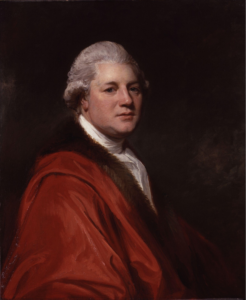The maid of Inistore
(Poet's title: Das Mädchen von Inistore)
Set by Schubert:
D 281
Schubert omitted the words in italics.[September 1815]
Mädchen Inistores,
wein auf dem Felsen der stürmischen Winde,
neig über Wellen dein zierliches Haupt,
du, dem an Liebreiz der Geist der Hügel weicht,
wenn er in einem Sonnenstrahl des Mittags
über Morvens Schweigen hingleitet.
Er ist gefallen, der Jüngling erliegt,
bleich unter der Klinge Cuthullins!
Nicht mehr wird der Mut deinen Lieben erheben,
dem Blut der Gebieter zu gleichen.
O Mädchen Inistores,
Trenar, der zierliche Trenar ist tot:
In seiner Heimat heulen seine grauen Doggen,
sie sehn seinen gleitenden Geist.
In seiner Halle liegt sein Bogen ungespannt,
man hört auf dem Hügel seiner Hirsche keinen Schall.
Weep on the rocks of roaring winds,
O maid of Inistore!
Bend thy fair head over the waves,
thou lovelier than the ghost of the hills;
when it moves in a sun-beam, at noon,
over the silence of Morven!
He is fallen, thy youth is low!
pale beneath the sword of Cuthullin!
No more shall valour raise thy love
to match the blood of kings.
Trenar, graceful Trenar died,
O maid of Inistore!
His grey dogs are howling at home!
they see his passing ghost.
His bow is in the hall unstrung.
No sound is in the hall of his hinds!
English original
All translations into English that appear on this website, unless otherwise stated, are by Malcolm Wren. You are free to use them on condition that you acknowledge Malcolm Wren as the translator and schubertsong.uk as the source. Unless otherwise stated, the comments and essays that appear after the texts and translations are by Malcolm Wren and are © Copyright.
☙
Themes and images in this text:
Blood Bows and arrows Deer Dogs Heads Hills and mountains Hunters and hunting Laments, elegies and mourning Midday Mountains and cliffs Noise and silence Rays of light Tears and crying Waves – Welle Wind
James Macpherson’s 1762 edition of the prose poems of ‘Ossian’ includes a number of footnotes designed to give the impression that he (Machpherson) was simply collecting and modernising (rather than actually creating) these ancient texts. Here is his own explanation of the background to this extract from ‘Fingal, Book I’:
The maid of Inistore was the daughter of Gorlo, king of Insistore, or Orkney Islands. Trenar was brother to the king of Iniscon, supposed to be one of the islands of Shetland. The Orkneys and Shetland were at that time subject to the king of Lochlin. We find that the dogs of Trenar are sensible at home of the death of their master, the very instant he is killed. It was the opinion of the times, that the souls of heroes went immediately after death to the hills of their country, and the scenes they frequented the most happy times of their life. It was thought, too, that dogs and horses saw the ghosts of the deceased.
Trenar has been killed in a battle between Cuthullin, the Irish general, and Swaran, king of Lochlin. Here is Ossian’s account of the battle itself:
Like autumn's dark storms, pouring from two echoing hills, towards each other approached the heroes. Like two deep streams from high rocks meeting, mixing, roaring on the plain; loud, rough and dark in battle meet Lochlin and Innis-fail. Chief mixes his strokes with chief, and man with man; steel, clanging, sounds on steel. Helmets are cleft on high. Blood bursts and smokes around. Strings murmur on the polished yews. Darts rush along the sky. Spears fall like the circles of light, which gild the face of night. As the noise of the troubled ocean, when roll the waves on high. As the last peal of thunder in heaven, such is the din of war! Though Cormac's hundred bards were there to give the fight to song; feeble was the voice of a hundred bards to send the deaths to future times! For many were the deaths of heroes; wide poured the blood of the brave!
It is this noisy insistence on ‘the din of war’ that makes the silence at the end of the lament for Trenar so powerful. Although his mastiffs are howling, the main impact we are left with is the silence of the deer that he should be hunting. His bow is now and forever unstrung. Even as a ghost on the hills he ‘moves in a sun-beam, at noon, over the silence of Morven’.
☙
Original Spelling Das Mädchen von Inistore Mädchen Inistores, wein auf dem Felsen der heulenden Winde! neig über die Wellen dein zierliches Haupt, du, dem an Liebreiz der Geist der Hügeln weicht; Wenn er in einem Sonnenstrahl, des Mittags über Morvens Schweigen hingleitet. Er ist gefallen! der Jüngling erliegt, bleich unter der Klinge Cuthullins! nicht mehr wird der Muth deinen Geliebten erheben, dem Blut der Gebieter zu gleichen. O Mädchen Inistores! Trenar, der zierliche Trenar ist todt. In seiner Heymat heulen seine grauen Doggen; sie sehn seinen gleitenden Geist. In seiner Halle ist sein Bogen ungespannt, Man hört auf dem Hügel seiner Hirsche keinen Schall!
Confirmed by Peter Rastl with Schubert’s source, Die Gedichte Ossians, eines alten celtischen Helden und Barden. Zweyter Band. Zweyte verbesserte und mit neu entdeckten Gedichten vermehrte Auflage. Mannheim 1782, im Verlage der Herausgeber der ausländischen schönen Geister, pages 62-63.
To see an early edition of the text, go to Page 62 Erstes Bild 68 here: https://download.digitale-sammlungen.de/BOOKS/download.pl?id=bsb10035581


